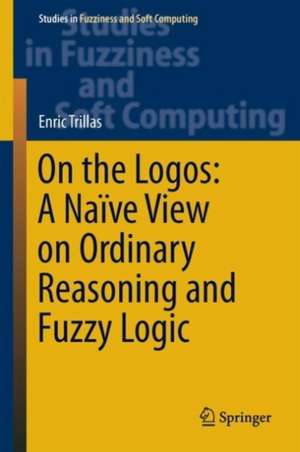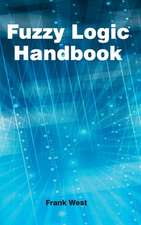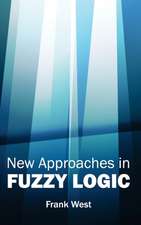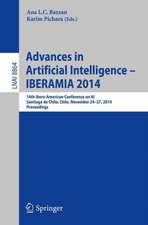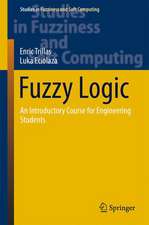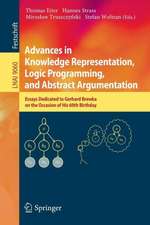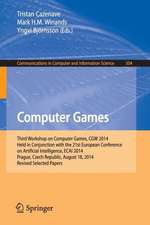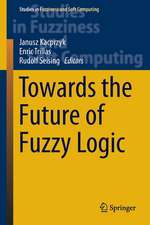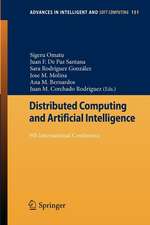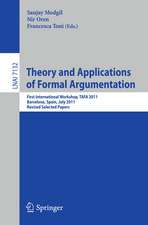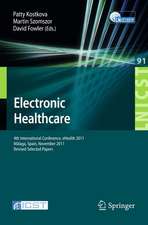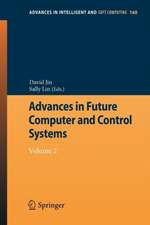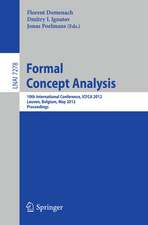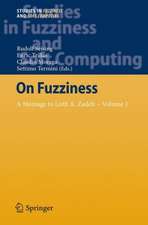On the Logos: A Naïve View on Ordinary Reasoning and Fuzzy Logic: Studies in Fuzziness and Soft Computing, cartea 354
Autor Enric Trillasen Limba Engleză Hardback – 16 mai 2017
Written in a discursive style and without too many technicalities, the book presents a number of reflections on the study of reasoning, together with a new perspective on fuzzy logic and Zadeh’s “computing with words” grounded in both language and reasoning. It also highlights some mathematical developments supporting this view. Lastly, it addresses a series of questions aimed at fostering new discussions and future research into this topic. All in all, this book represents an inspiring read for professors and researchers in computer science, and fuzzy logic in particular, as well as for psychologists, linguists and philosophers.
| Toate formatele și edițiile | Preț | Express |
|---|---|---|
| Paperback (1) | 642.19 lei 43-57 zile | |
| Springer International Publishing – 28 iul 2018 | 642.19 lei 43-57 zile | |
| Hardback (1) | 648.44 lei 43-57 zile | |
| Springer International Publishing – 16 mai 2017 | 648.44 lei 43-57 zile |
Din seria Studies in Fuzziness and Soft Computing
- 20%
 Preț: 999.85 lei
Preț: 999.85 lei - 20%
 Preț: 653.06 lei
Preț: 653.06 lei - 20%
 Preț: 872.98 lei
Preț: 872.98 lei - 20%
 Preț: 930.57 lei
Preț: 930.57 lei - 20%
 Preț: 1051.00 lei
Preț: 1051.00 lei - 20%
 Preț: 992.44 lei
Preț: 992.44 lei - 20%
 Preț: 655.85 lei
Preț: 655.85 lei - 20%
 Preț: 1001.86 lei
Preț: 1001.86 lei - 18%
 Preț: 954.14 lei
Preț: 954.14 lei - 20%
 Preț: 330.10 lei
Preț: 330.10 lei - 20%
 Preț: 333.04 lei
Preț: 333.04 lei - 20%
 Preț: 997.56 lei
Preț: 997.56 lei -
 Preț: 391.61 lei
Preț: 391.61 lei - 20%
 Preț: 647.79 lei
Preț: 647.79 lei - 20%
 Preț: 986.01 lei
Preț: 986.01 lei - 18%
 Preț: 958.56 lei
Preț: 958.56 lei - 20%
 Preț: 996.40 lei
Preț: 996.40 lei - 20%
 Preț: 999.35 lei
Preț: 999.35 lei - 15%
 Preț: 646.43 lei
Preț: 646.43 lei - 20%
 Preț: 651.57 lei
Preț: 651.57 lei - 20%
 Preț: 997.89 lei
Preț: 997.89 lei - 15%
 Preț: 641.03 lei
Preț: 641.03 lei - 20%
 Preț: 1009.74 lei
Preț: 1009.74 lei - 20%
 Preț: 992.62 lei
Preț: 992.62 lei -
 Preț: 388.72 lei
Preț: 388.72 lei - 18%
 Preț: 1223.43 lei
Preț: 1223.43 lei - 20%
 Preț: 651.42 lei
Preț: 651.42 lei - 18%
 Preț: 951.59 lei
Preț: 951.59 lei - 18%
 Preț: 948.61 lei
Preț: 948.61 lei
Preț: 648.44 lei
Preț vechi: 810.55 lei
-20% Nou
Puncte Express: 973
Preț estimativ în valută:
124.10€ • 129.08$ • 102.45£
124.10€ • 129.08$ • 102.45£
Carte tipărită la comandă
Livrare economică 14-28 aprilie
Preluare comenzi: 021 569.72.76
Specificații
ISBN-13: 9783319560526
ISBN-10: 3319560522
Pagini: 213
Ilustrații: XIV, 213 p.
Dimensiuni: 155 x 235 x 14 mm
Greutate: 0.5 kg
Ediția:1st ed. 2017
Editura: Springer International Publishing
Colecția Springer
Seria Studies in Fuzziness and Soft Computing
Locul publicării:Cham, Switzerland
ISBN-10: 3319560522
Pagini: 213
Ilustrații: XIV, 213 p.
Dimensiuni: 155 x 235 x 14 mm
Greutate: 0.5 kg
Ediția:1st ed. 2017
Editura: Springer International Publishing
Colecția Springer
Seria Studies in Fuzziness and Soft Computing
Locul publicării:Cham, Switzerland
Cuprins
Introduction.- Meaning as a Quantity.- Antonyms, Negation, and the Fuzzy Case.- ‘And’, and ‘Or’ in Language. The case with Fuzzy Sets.- A First Look at Conditional Statements.- Linguistic Qualification, and Synonymy.- Thinking, Analogy, and Reasoning.- A (Naïve) Symbolic Model of Ordinary Reasoning.- A Glance at Analogy.- A Glance at Creative Reasoning.- Formal Reasoning with Precise Words.- Formal Reasoning with Imprecise Words.- A Few Questions on the Reasoning of Quantum Physics.- Questions on Uncertain, Possible, and Probable.- Questions on Domesticating and Controlling Analogy.- Questions on the Classical Schemes of Inference.- Questions on the Fuzzy Schemes of Inference.- Questions on Monotony.- Questions on ‘Not Covered by P’.- Questions on ‘Sorites’ in Ordinary Reasoning.- A Few Questions on Naming Concepts.- Instead of a Conclusion.- To End Up.
Recenzii
“It is more of a philosophical text that touches several issues that daily confront people involved in artificial intelligence, natural language understanding, and fuzzy modeling. Due to its thought-provoking nature, sometimes re-reading is necessary in order to fully understand the author’s thoughts. Reading this book may raise feelings of a disparate nature: excitement, perplexity, enlightenment, and incompleteness. In all cases, the ingenuous will surely find stimuli for further thinking and meditation.” (Corrado Mencar, Computing Reviews, April, 2018)
Textul de pe ultima copertă
This book offers an inspiring and naïve view on language and reasoning. It presents a new approach to ordinary reasoning that follows the author’s former work on fuzzy logic. Starting from a pragmatic scientific view on meaning as a quantity, and the common sense reasoning from a primitive notion of inference, which is shared by both laypeople and experts, the book shows how this can evolve, through the addition of more and more suppositions, into various formal and specialized modes of precise, imprecise, and approximate reasoning. The logos are intended here as a synonym for rationality, which is usually shown by the processes of questioning, guessing, telling, and computing.
Written in a discursive style and without too many technicalities, the book presents a number of reflections on the study of reasoning, together with a new perspective on fuzzy logic and Zadeh’s “computing with words” grounded in both language and reasoning. It also highlights some mathematical developments supporting this view. Lastly, it addresses a series of questions aimed at fostering new discussions and future research into this topic. All in all, this book represents an inspiring read for professors and researchers in computer science, and fuzzy logic in particular, as well as for psychologists, linguists and philosophers.
Written in a discursive style and without too many technicalities, the book presents a number of reflections on the study of reasoning, together with a new perspective on fuzzy logic and Zadeh’s “computing with words” grounded in both language and reasoning. It also highlights some mathematical developments supporting this view. Lastly, it addresses a series of questions aimed at fostering new discussions and future research into this topic. All in all, this book represents an inspiring read for professors and researchers in computer science, and fuzzy logic in particular, as well as for psychologists, linguists and philosophers.
Caracteristici
Offers a new synthesis on the topic of ordinary reasoning and plain language Paves the way for a new approach to creative reasoning based on common sense reasoning and natural language Discusses both philosophical questions and mathematical findings Includes supplementary material: sn.pub/extras
